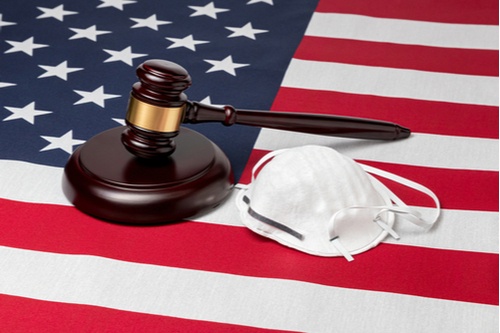Recently, you may have seen or heard Massachusetts Attorney General Maura Healey state in an interview that she believes COVID-19 vaccinations should be mandatory for public employees. “Look, you’re there, you’re getting paid by the taxpayer – you have an obligation, whether it’s delivering public health or public safety” proclaimed the Attorney General, who has long been rumored as a possible candidate for governor next year (for his part, current Governor Charlie Baker has been more reserved about whether or not to mandate vaccinations). But, the question surrounding mandatory vaccinations is not limited to just public-sector employees. Most schools in Massachusetts, and every school that is part of the Massachusetts state university system, has recently indicated that they will require students to be vaccinated against COVID-19 before they attend in-person classes next fall, with some schools and universities even going so far as to require all employees and staff to also be vaccinated. So, what does this mean for private employees and employers?
On December 16, 2020, the U.S. Equal Employment Opportunity Commission (“EEOC”) issued guidance addressing various questions surrounding the applicability of certain equal employment opportunity laws within the context of an employer mandating the COVID-19 vaccination. More specifically, the EEOC put forth guidance on how mandatory vaccinations intertwine with the Americans with Disabilities Act (“ADA”) and Title VII of the Civil Rights Act (“Title VII”), among other areas. Unfortunately, while this guidance does answer many key questions, it also leaves many others unanswered. Moreover, as the situation surrounding COVID-19 continues to change and evolve, so to do the challenges faced by employers and their workforce.
Below is a brief overview of some of the key issues identified by the EEOC with regard to employers mandating the COVID-19 vaccination. Due to the complexities involved, as well as the individual nature of many of these challenges, we urge employers and employees to consult with us should you have any questions in assessing the legality, practicability, and enforceability of a mandatory COVID-19 vaccination program for your workforce.
2. Mandatory COVID-19 Vaccinations and the ADA.
Pursuant to the ADA, employers are permitted to exclude employees from the workforce who pose a “direct threat” to the health or safety of persons in the workplace. Whether an employee poses a “direct threat” is assessed pursuant to a variety of factors including the duration of the risk, the nature and severity of the potential harm, the likelihood that the potential harm will occur, and the imminence of the potential harm. In addition to these four factors, the employer must also demonstrate that the unvaccinated employee presents a significant risk of substantial harm to the health and safety of themselves and others and that such risk cannot be eliminated or reduced via a reasonable accommodation. In the event that an employer determines that an unvaccinated employee does pose a “direct threat” and that such threat cannot be reduced or eliminated by reasonable accommodation, then the employer can prohibit the employee from physically entering the workplace and possibly terminate the employee (employers are advised to consult with us first as each individual case is different).
Because of this, it is certainly true that employers can require their employees to get the COVID-19 vaccination in order to reduce a “direct threat.” However, in doing so, employers must also be prepared to respond to their employees who claim that they are unable to get vaccinated due to a disability under the ADA.
In addition to the above issues, there is a myriad of other concerns that may arise as a result of an employer mandating the COVID-19 vaccination. For example, asking or requiring an employee to show proof of a COVID-19 vaccination is not considered a disability-related inquiry. However, subsequent follow-up questions, such as why the employee has not or will not receive the vaccination, may ultimately elicit disability-related information triggering additional standards for the employer to meet. Another situation to be aware of is with pre-vaccination medical screening questions. More specifically, screening questions that are asked before an employer-mandated vaccination may be “disability-related” under the ADA and, therefore, the employer must be able to establish that the screening inquiries are “job-related and consistent with business necessity.” According to the EEOC’s guidance, the employer in these scenarios must have a reasonable belief, based on objective evidence, that an employee who does not answer the disability-related screening questions and therefore does not receive the vaccination, will pose a “direct threat” to the health or safety of himself/herself or others in the workplace.
2. Mandatory COVID-19 Vaccinations and Title VII.
In addition to the multitude of potential ADA implications highlighted above, employers with mandatory COVID-19 programs must also be prepared to respond to and evaluate requests by employees claiming that their sincerely held religious beliefs, practices, or observances prevent them from receiving a COVID-19 vaccination. In such instances, employers must provide reasonable accommodation to the employee requesting one unless it would pose an undue hardship to the employer under Title VII.
We expect more questions to arise as to what is precisely defined as a sincerely held religious belief, practice, or observance as opposed to merely a political belief or practice. At present, the EEOC has instructed employers to assume an employee’s request for religious accommodation is rooted in a sincerely held religious belief, practice, or observance. Nevertheless, if an employer has an objective basis for questioning either the religion or the sincere nature of the particular belief, practice, or observance, the employer may request additional supporting information to evaluate the request for accommodation.
We will continue to monitor these issues and keep you apprised of any new developments. Please feel free to contact me with any questions or concerns about any aspect of this post.

